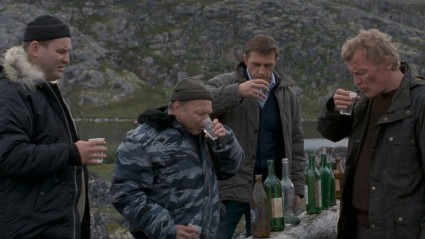Country: USA; Director: Laurie Anderson; Starring: Laurie Anderson, Lollabelle
B+/B+/B/B+ (A lot of fascinating ideas and cinematic technique that keeps inspiring)
Laurie Anderson mediates on time, stories, memory, art, and the last moments of her dog.
For those who haven’t been able to experience a live show by the filmmaker / musician / performance artist / Sprite of Genius that is Laurie Anderson, this movie is a great way to get a glimpse of what’s going on in her head. It’s a marvelous place – inventive, whimsical, insightful, and full of fascinating connections and tangents.
 Here it starts its focus on her dog Lolabelle, but soon branches out to include paintings, philosophy, ambient and symphonic musical pieces, early 8mm footage from Anderson’s childhood, and thoughts on the United States of Surveillance. There are leaps in thought from subject to subject that are wondrous to ponder (like how the NSA data center in the Utah desert is a massive structure holding important information in perpetuity, making it the Pyramids of our day), delivered without a hint of condescension or pretension. Such creativity not only shows up in the ideas, but how they’re presented, such as showing the idea of the data “cloud” as a set of constantly changing ASCII letters that show a coded picture of a literal cloud moving across the sky.
Here it starts its focus on her dog Lolabelle, but soon branches out to include paintings, philosophy, ambient and symphonic musical pieces, early 8mm footage from Anderson’s childhood, and thoughts on the United States of Surveillance. There are leaps in thought from subject to subject that are wondrous to ponder (like how the NSA data center in the Utah desert is a massive structure holding important information in perpetuity, making it the Pyramids of our day), delivered without a hint of condescension or pretension. Such creativity not only shows up in the ideas, but how they’re presented, such as showing the idea of the data “cloud” as a set of constantly changing ASCII letters that show a coded picture of a literal cloud moving across the sky.
 But it’s very much a rollercoaster ride of ideas, and while you will leave the movie in a more thoughtful and curious state, there’s not a lot of structure to take all these parts and have them fit in a single framework. Ultimately, the main themes of “Heart of a Dog” are how Lollabelle’s health issues cause Laurie Anderson to go through a reckoning of her past and a primer on how to deal with loss (one Buddhist concept mentioned is, “how to feel sad, without being sad”). This leads to a trek through the Tibetan Book of the Dead on one side, and a look back on Andersons part about the stories she tells on the other. It culminates in a masterful sequence where Anderson runs a poetic monologue about events in her life, using the phrase, “Recognize This?” as both a mantra and as punctuation.
But it’s very much a rollercoaster ride of ideas, and while you will leave the movie in a more thoughtful and curious state, there’s not a lot of structure to take all these parts and have them fit in a single framework. Ultimately, the main themes of “Heart of a Dog” are how Lollabelle’s health issues cause Laurie Anderson to go through a reckoning of her past and a primer on how to deal with loss (one Buddhist concept mentioned is, “how to feel sad, without being sad”). This leads to a trek through the Tibetan Book of the Dead on one side, and a look back on Andersons part about the stories she tells on the other. It culminates in a masterful sequence where Anderson runs a poetic monologue about events in her life, using the phrase, “Recognize This?” as both a mantra and as punctuation.





 But like ripples emanating from a tar pit, it soon becomes apparent that much more than a local conflict is going on. Both our main character’s side and the Mayor’s are shown as tied to larger, darker forces outside the main story, while limited in their outlook and resolve themselves. And the film’s worldview expands in response, showing how the conflict is a wave reflected in the community, local government, Russian society, and even tied to religion itself.
But like ripples emanating from a tar pit, it soon becomes apparent that much more than a local conflict is going on. Both our main character’s side and the Mayor’s are shown as tied to larger, darker forces outside the main story, while limited in their outlook and resolve themselves. And the film’s worldview expands in response, showing how the conflict is a wave reflected in the community, local government, Russian society, and even tied to religion itself.



